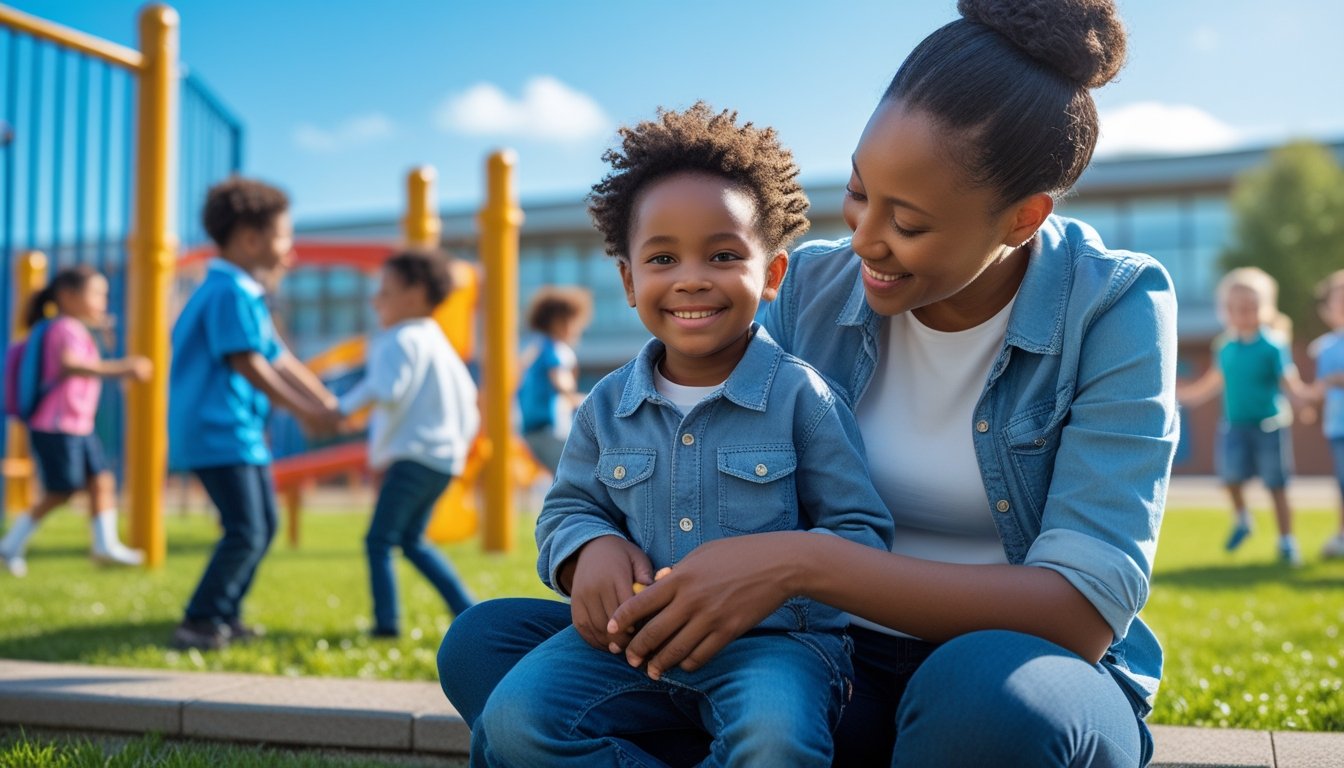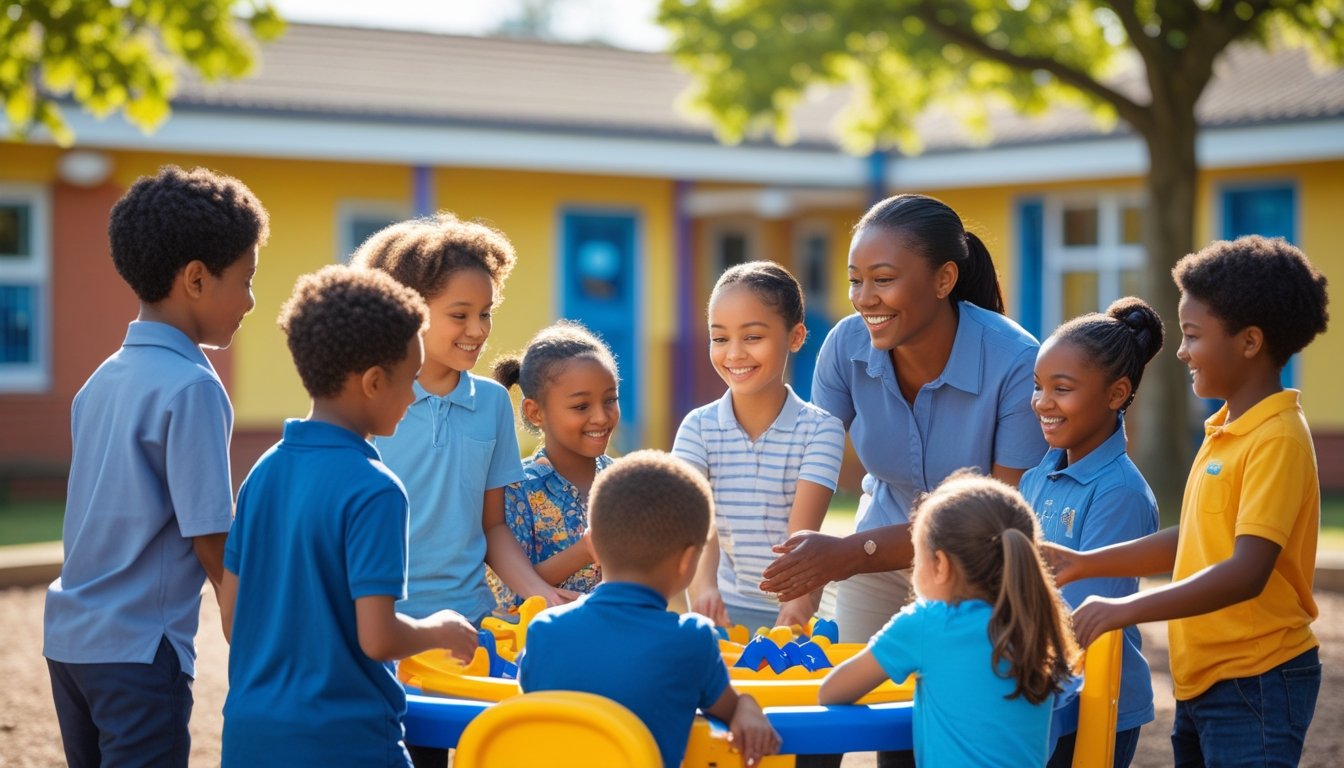Late updated: 14 Jul 2025 18:07
Written by:
Guiding Your Child Through School Friendships: Building Strong Social Skills
Navigating the world of school friendships can be a daunting task for both children and parents. The dynamics of peer relationships are often unpredictable and can significantly affect a child's emotional and social development. Our role as parents is crucial in guiding our children towards healthy and supportive friendships that not only thrive in their school years but also lay the foundation for lasting relationships.

We want to equip our children with the skills and confidence to handle the challenges that come their way. From understanding the subtlety of social cues to managing conflicts gracefully, these skills are vital. Our guidance can provide them with the resilience and empathy they need to succeed in this complex environment.
We will explore practical strategies that address common issues children face in school friendships and provide answers to frequently asked questions. Together, let's embark on this journey to support our children in building meaningful and fulfilling relationships.
Key Takeaways
- Parents play a vital role in children’s friendships.
- Practical strategies help in managing friendship challenges.
- FAQs provide insights into common social issues.
Understanding and Supporting Your Child’s School Friendships
Our focus is on the significance of friendships in a child's life, recognising signs of healthy social interactions, and encouraging the skills necessary for positive friendships. By providing guidance, we help children navigate the complexities of school friendships with empathy and effective communication.
Why Friendships Matter in Childhood
Childhood friendships offer a foundation for social learning. They are vital for fostering a child's sense of belonging and self-esteem. With these relationships, children learn crucial social skills such as cooperation and teamwork.
Peer interactions often serve as a domain for practising empathy skills and building strong interpersonal connections. Friendships provide an opportunity for children to explore different perspectives and develop a deeper emotional understanding, contributing to their overall social competence.
Recognising Healthy Friendships and Social Dynamics
Identifying healthy friendships involves observing how children interact with peers. Good friends respect each other, encourage positive behaviours, and resolve conflicts amicably.
We should watch for signs of peer pressure or negative social dynamics that might adversely affect a child's emotional wellbeing. When children feel respected and valued, they thrive in their social environments.
Open communication with children can help identify whether their friendships are beneficial, ensuring they are supported in maintaining positive peer relationships.
Building Social and Communication Skills
Developing communication skills is pivotal for nurturing healthy friendships. Engaging in open dialogues helps children articulate their feelings and thoughts clearly while also listening actively to others.
We can encourage role-playing scenarios to aid in practising conversation skills and handling potential conflicts in friendships. These interactions not only improve verbal communication but also enhance non-verbal cues, helping children navigate the subtleties of social interactions.
Strong communicative ability enables children to express empathy and understand their friends' emotions better, strengthening their bonds.
Fostering Empathy and Kindness in School Settings
Empathy is key to forming lasting friendships. Encouraging empathy involves teaching children to be aware of and considerate toward others' feelings.
Classroom activities and discussions focusing on kindness and respect help build a supportive school community. We must prompt children to take the perspective of others which deepens their empathy skills.
When children practice kindness in school settings, it fosters an environment conducive to positive peer interactions and healthy friendships. Through communal activities and shared experiences, they learn the value of cooperation and mutual support.
Practical Strategies for Navigating School Friendships

Parents play a crucial role in supporting their children through the complexities of school friendships. By focusing on fostering social interactions, addressing peer pressure, and promoting conflict resolution, we can help children build healthy relationships.
Encouraging Positive Social Interactions and Playdates
Facilitating positive social interactions is key to forming lasting friendships. We can arrange playdates to provide children with opportunities to learn valuable skills like taking turns and sharing. Encouraging participation in extracurricular activities, such as sports or clubs, helps children meet peers and form connections outside the classroom.
Implementing a buddy system at school can also promote inclusivity. Teachers can pair children with different classmates to interact with, helping them to develop new friendships and learn from others. Schools that include playground games and cooperative tasks further support positive social dynamics, enhancing a sense of belonging and self-esteem.
Helping Children Navigate Peer Pressure, Exclusion, and Bullying
Peer pressure, exclusion, and bullying are serious challenges in school settings. We must educate children on identifying these situations and empower them to stand up for themselves. Teaching assertiveness and communication skills is essential. Encouraging children to express their feelings and set boundaries will help them handle difficult situations confidently.
Involving children in discussions about their school experiences can provide insights into their social landscape. By addressing their worries openly, we can help them develop resilience and self-confidence. Building strong family relationships gives children a secure foundation to manage social hurdles and maintain mental health.
Supporting Conflict Resolution and Emotional Regulation
Friendship conflicts are inevitable but also opportunities for growth. We should teach children how to engage in conflict resolution by guiding them through problem-solving steps. Helping them identify the issue, consider possible solutions, and agree on a mutual resolution nurtures important life skills.
It is vital to support emotional regulation. Encouraging children to express emotions in healthy ways, such as talking, drawing, or writing, aids in managing their feelings. We can use positive reinforcement to commend effective handling of conflicts, promoting self-esteem and a sense of accomplishment.
Together, these strategies equip children to navigate the complexities of friendships and develop into well-rounded individuals.
Frequently Asked Questions

Guiding our children through school friendships can be both a rewarding and challenging experience. It's essential to offer support while teaching them vital social skills and how to handle various social situations they may encounter at school.
How can I support my child's ability to make friends at school?
We can encourage our children to participate in group activities, where they can interact with peers in a low-pressure environment. Setting up playdates and getting to know their friends can also create opportunities for deeper connections.
What strategies exist for teaching children about maintaining healthy friendships?
Teaching children good communication and conflict resolution skills can be beneficial. We can model respect and empathy in our own relationships, helping our children understand the importance of these qualities in their friendships.
What should I do if my child feels excluded by their peers at school?
First, we should listen to their concerns without judgment and validate their feelings. Working with teachers and school staff to understand the situation can be helpful. Encouraging our children to reach out to other peers can also open doors to new friendships.
Are there any recommended lesson plans to help children understand friendship?
We can find lesson plans designed by educational professionals focusing on empathy, cooperation, and communication skills. Many schools provide resources that cover social-emotional learning, which can be adapted for use at home.
How can I discuss the value of friendship with my child effectively?
Open conversations about the qualities of a good friend and why friendships matter can be enlightening. We can share personal stories of our own friendships, illustrating how friends have supported us and enriched our lives.
What are some signs of a healthy friendship that I can teach my child?
Signs include mutual respect, trust, and enjoyment of each other's company. Teaching children to look for friends who listen, share, and support them, as well as those who respect boundaries, can set the foundation for healthy relationships.
